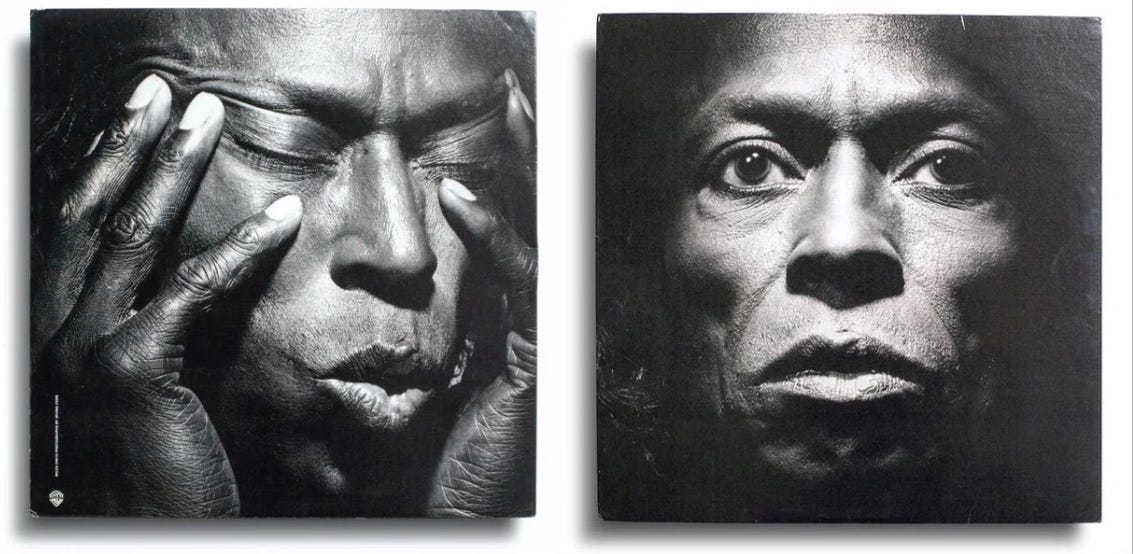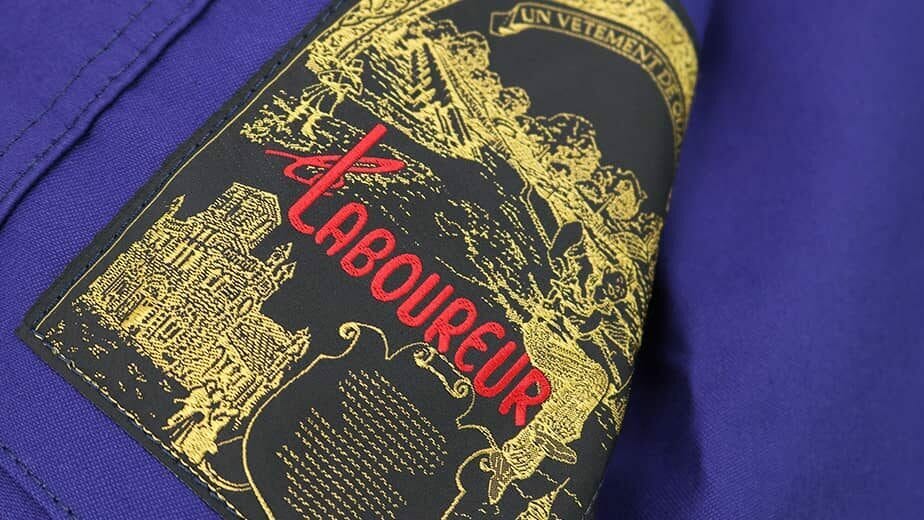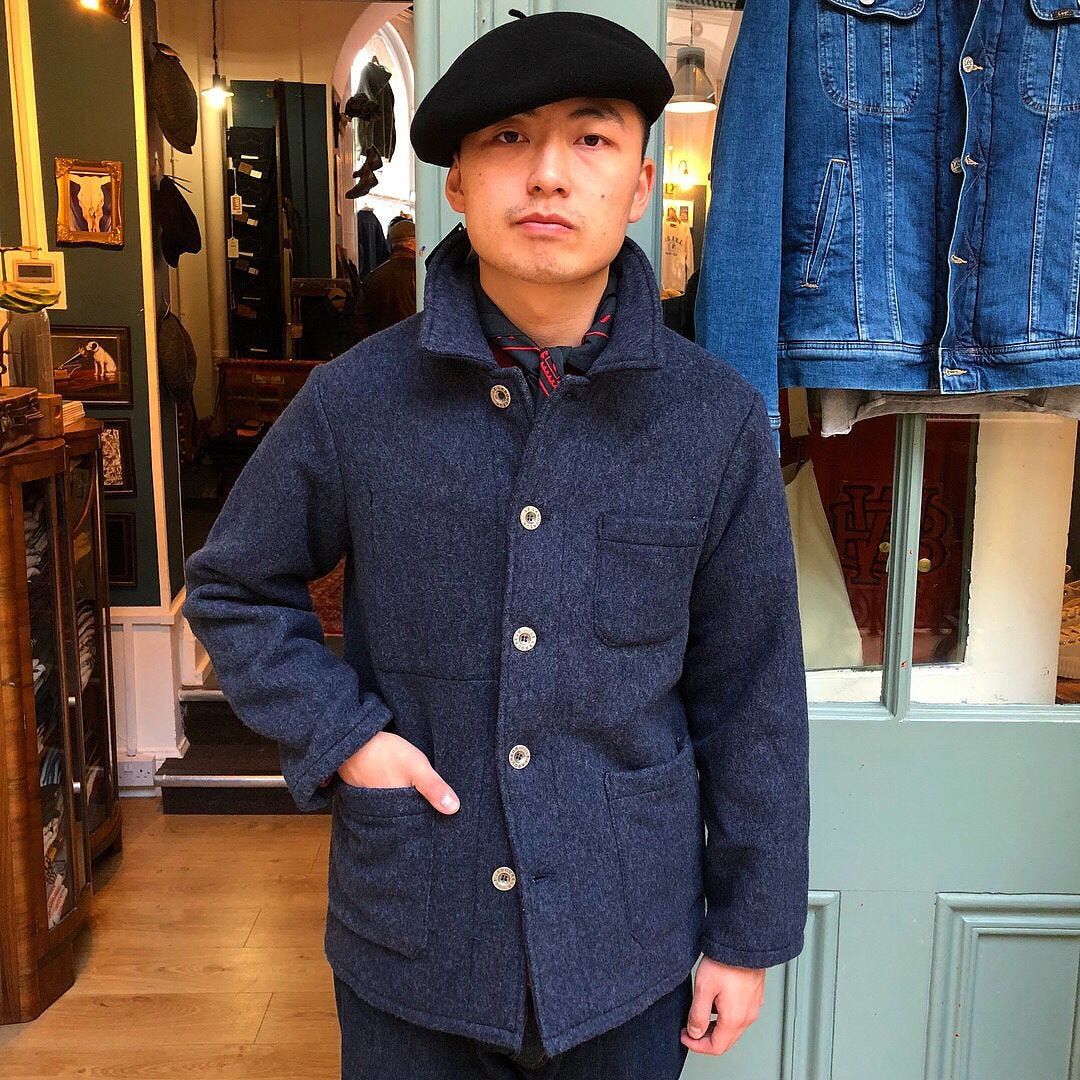Interview with Mano Dridi of All Blues Co
All Blues Co store owner dives deep into his background, business of clothing and personal obsession with menswear.
Ivy Style was the first thing that got me genuinely interested in clothing. Many trends have come and gone over the last 15 years but I still appreciate the sophisticated elegance of mid-century American style and its numerous reincarnations. That is why I was so excited to stumble upon the All Blues Co store on Instagram back in 2018.
The store appeared a bit weird to me at first. Operating out of Leeds, All Blues Co didn’t have a website, and along with the brands I already knew and loved, it featured a bunch of labels I had never heard of. Apparently, all those unknown brands came from South Korea. Yet, the overall curation was executed so well that it instantly cought my attention.
Five years later, many of those South Korean labels are well-known and readily available for purchase in the Western world. Meanwhile, All Blues Co managed to attract one of the most sought-after brands in the industry and launch its own eponymous line of clothing. I am so in love with the Heavyweight Pocket Tee that I reviewed mine and even gifted a couple to my friends.
As an outside observer, I feel like All Blues Co boasts one of the most curated selections in the world of slow fashion. J. M. Weston loafers, Alden Indy boots, Harley of Scotland Shetland sweaters, Rocky Mountain Featherbed downs, Camber sweatshirts, Asahi deck shoes, etc. All the usual suspects. Yet, there are virtually no other shops that manage to maintain that classic Ivy Style without diving in a whole lot of other directions.
I reached out to Mano Dridi of All Blues Co to find out his story. The man turned out to be so passionate about clothing that two hours of our conversation just flew by. I hope you will feel it while reading the interview. Don’t rush. Make yourself a big cup of tea and let it flow. It’s a vibe.

Small ask: If you find this interview exciting or helpful, I’d be incredibly grateful if you helped others discover it. Hitting ❤️ , or sharing/restacking, are all a huge help. Thank you!
PS If you are viewing this post in your email app, consider opening it in browser by clicking the post’s title — it might be too long to fit into an email.
Hey Mano✌️ First of all, I'm keen to learn about your background. Can you share your childhood and teenage years before entering the retail business?
I come from a catering background. I've been a chef since I was a child, influenced by my family. I've always had a passion for clothing though, particularly streetwear. Growing up in the '80s, the influence was huge.
Back then, there was no internet, only magazines, and the style cues came from the people in your neighborhood, like your uncle, your dad, or your family members. We had immense respect for our elders, not just in age but also in how they dressed because we drew inspiration from them.
I still remember my first pair of Levi's when I was ten years old.
In the late '80s, my uncle had Levi's, Made in USA, and it was a big deal. To me as a young kid, it was like a meteorite falling from the sky; that's how significant it was.
Oh word?
Absolutely. I don't know if you can recall, but Levi's Made in USA in the late '80s were pretty rare to find.
That was even before I was born.
People used to travel to the US just to acquire them. I admired that dedication.
It's fascinating, especially considering there was no Internet. It's like people were discussing it on forums but without the technology.
It was incredible, especially in terms of style. Nowadays, it's different because of the commercial aspect. It's advantageous for us as shop owners. I appreciate Instagram. But in terms of style, it was more authentic back then. There's just so much going on these days.
Indeed, a lot of noise and hype.
It's good, but it's different. So, that's my journey. I've worked part-time in clothing shops since I was a kid, even though I became a chef at 16. I've always had this obsession with reselling.
I used to resell sneakers and streetwear. I got into Supreme when I moved to England in 2000–2001. Back then, the brand was virtually unknown.
At that time, England had the best shops for casual menswear, especially that cool subculture vibe. Some people might think otherwise, but I believe in that 100%. I'm not even from England, but I've witnessed it firsthand.
Then, there were the Japanese streetwear brands like Neighborhood, Wtaps, and Visvim. I found out that you could buy them at half the price in Japan. That's when I started using proxy services, around the time the Internet blew off in the mid-00s.
That’s how I made like-minded friends as well. Many of us ended up working in the clothing industry. But we all started as these crazy streetwear collectors.
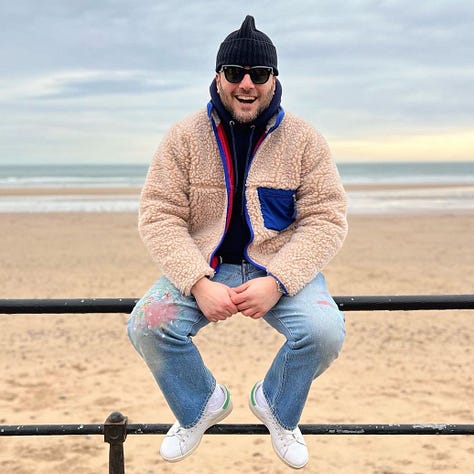
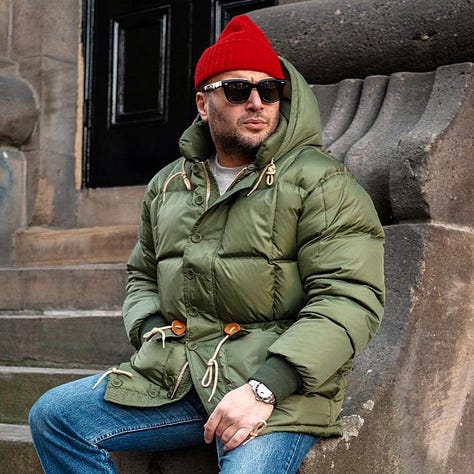
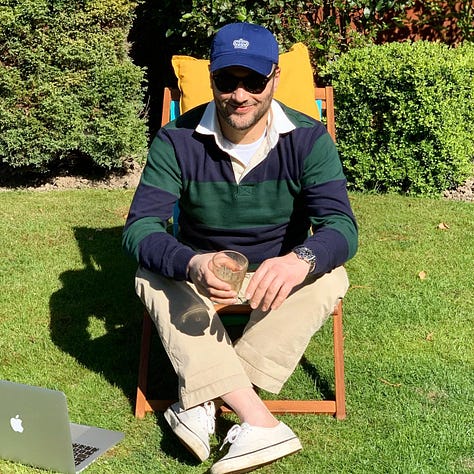
Streetwear?
Yeah, it’s sad that the term «streetwear» has been ruined at the moment. It wasn’t about a particular sneaker or something. It was about looking different. It was about looking at the person in front of you and deliberately dressing differently from them. You'd dress for yourself and maybe a handful of like-minded folks.
So, yeah, it’s an obsession for me.
Did you have other interests? I read somewhere that you're really into jazz.
It’s all part of the story. You see, my greatest influence in life, overall, was my grandfather, god rest his soul. He was a working-class Italian, well, half-Italian but mostly Italian. When you saw him walking down the street, you'd think he was a wealthy man, you know what I mean?
My grandfather had a deep respect for his appearance. In the '60s he was a manager of a discotheque (laughing). He was a hard man. And he had this cool style.
I remember as a kid, he had this huge collection of vinyl records, probably gifts from his days at the disco or something. Among them, there was a lot of this strange, noisy music called jazz. Because jazz isn't something you appreciate as a kid. It's like espresso. I only drink espresso now, but I wouldn't have thought about it when I was ten or fifteen, you know what I mean? You build into that.
And if you have a family member who, in your mind, seems like the perfect match for you, you see them as an example of everything you want to be.
Like a role model.
Exactly, a role model. My granddad was a typical '60s, '70s, and '80s kind of guy, always suited and booted, and well-groomed because that was the norm back then. Now, you have to make an effort, but back then, it was standard. It's all that kind of being smart and wanting to look your best before you leave the house. You don't have to be rich. You can be poor. It doesn’t matter.
I respect that because it's a form of politeness. There's a reason why they say not to judge a book by its cover, but most of the time, you actually do. You shouldn't, but it's a part of human nature. It's a philosophical question.
But it all ties to jazz.
Totally. The first album cover that stuck with me was Tutu by Miles Davis. It was when he was diving into hard drugs, although I didn't know that at the time. I realized it much later in life. This was when jazz took a turn, becoming noisier and more mainstream than your typical '60s jazz.
It all stays with you, and then it comes back. You feel a sense of pride in a way because you remember it. My upbringing was at my grandparents' house, you see? My granddad was like a father to me. He left a profound impact on me. Particularly the respect he had for dressing well.
It seems that All Blues Co's direction is largely centered around what I would call Ivy Style or mid-century American fashion, even though some of the brands are British and French. But this isn’t something your granddad wore, is it?
It played a significant role. As I mentioned, it's the foundation — respect for clothing and dressing smartly. My granddad was my biggest idol, even though my style wasn't the same as his. It's about the concept of looking sharp and taking care of yourself. It's about class and sophistication, and I'll never be exactly like him.
But what's fascinating is if you go back to the early '90s, archive brands like Lacoste, and Ralph Lauren, were heavily influenced by '60s Americana. Not workwear, but that yachting, lakeside, fancy look, you know what I mean?


I remember being obsessed with stripes and striped outfits when I was 12, 13, 14 years old. Then later on, I looked back and thought, wow, you didn't even know, because that's how fashion operates. It's beautiful how it takes elements from the past and reimagines them with a contemporary touch.
That's why I prefer not to label the All Blues Co. I want it to be more of a stylish boutique rather than just a workwear store.
When we first opened, people categorized us as a workwear shop, and I despised that label. Yeah, I really disliked it because, well, don't get me wrong, I love workwear; jeans are timeless. I don't like labels. Ivy League sounds good, but even the store is named after a jazz song, All Blues by Miles Davis. So there's a lot of jazz and Ivy League inspiration in the shop. But I want it to be synonymous with style.
Can you elaborate on what you mean by style?
Unfortunately, you often hear labeling like this is streetwear or that is workwear from guys who just recently jumped on the wagon. They don’t have years of experience. But then, thanks to Instagram, they start wearing certain brands that make them feel they are on it. You know who I'm talking about. And they're the self-appointed fashion dictators.
But people who come from some subculture, whether it's hip-hop, rock and roll, or hardcore, they have a background. They have their own reference points. They know why they dress this way or that way.
I'm not saying you have to belong to something specific. But when you have a background, it helps a lot.
I don't like this dismissive attitude toward the kids nowadays either. They're not all bad. Sometimes they're even smarter, even if they don't appear that way. They do their homework.
In the last two years, I've been quite impressed with what the younger guys are wearing. They're bringing back all the 90s stuff and they're not even realizing it’s the stuff from the 90s. I find myself liking it because it’s the way I dressed back then. With all the baggy pants and everything. And they're young.
I believe the older, the better because the older you are, the more styles you've been through, and the more you understand. So you can't judge a 20–25 year old yet.
Going back to your career in clothing. Did you start with Le Laboureur?
Le Laboureur played a significant role on the road to opening All Blues Co. As I mentioned, I had a job as a chef and have been doing well in reselling, primarily on eBay and various blogs.
I had never heard of Le Laboureur before until I started exploring Japanese websites. Believe it or not, nobody had heard of Le Laboureur in Europe. If somebody mentioned Le Laboureur, they were probably over 50 years old because it wasn't sold anywhere. How can you know a brand that wasn't sold anywhere?
Le Laboureur used to be a French workwear brand you'd find in shops that sell genuine workwear for doing real work, not the fashion stuff. I Googled it and found the website, but the website didn't sell anything; it was just a holding page. So I emailed them asking to buy a jacket. But they responded that they only wholesale to shops. So I asked them which shops sell the jackets in Europe, but nobody did. Boom!
I sold the jackets through Instagram. I asked people to send me pictures wearing the jackets, and I featured them. At first, all my customers were from China, Japan, and America. Then I pushed it on my personal Instagram account a bit, and people in England started to take notice. So, technically, I brought the brand back to the UK.
That’s basically how I became an agent for Le Laboureur. I was working with the stores from the Far East. Besides Japan, because they were already on it, obviously.
That was your first encounter with South Korea.
Exactly. The year was 2013, and South Korea was my biggest discovery. It has already been great for fashion, but nobody really talked about it; Japan was the main focus. Yet, I found all these unknown brands making American workwear and army wear in a Japanese kind of way.
I was into that sort of stuff. You know, Buzz Rickson, Real McCoy’s. I’m a bit of a history geek as well. I was obsessed with World War II-era clothing, I have read books on uniforms and all that.
Anyway, I stumbled upon these peculiar brands and I thought, you know what? I'm going to order something from them. My first purchase was an A-3 cap. You should have seen it when I tried on the stuff. Immaculate.
The quality was so impressive. I thought, how come no one is selling this stuff?
Since I was an agent, I began reaching out to these brands, telling them, I'll try to showcase their stuff in Europe. I went on trips to South Korea several times. Over the years, I have become the first to bring many of the Korean brands specializing in that Americana niche to the West.
How did you manage to sell them to customers who have never heard of menswear from South Korea?
That’s what the good shops do. You fill the shop with the brands people already trust. I did that too, even though I wasn’t particularly fond of some of these brands. Anyway, that’s how you build a reputation so you can introduce new brands. Because you have already built trust with your customers.
Then there is quality. The factories in South Korea require much lower minimum orders than in Europe. That’s why there are so many decent little brands over there. I was shocked when I opened my first parcel. I was shocked when I went shopping in person there. It becomes even more apparent when you see outerwear. You can’t find that quality in Europe or Japan for a comparable price.
Besides, I felt like there was an empty space in the market.
Most stores in the Western world were doing similar things. You have your giants that carry everything that’s out there and then you have smaller shops doing smaller versions of the giants.
By now, we can see that it worked. Because many of the Korean brands we carried at the beginning of All Blues Co are now available elsewhere.
How do you feel about it? You did the hard work of unearthing these unknown brands, and then everyone else jumped on the train.
I was prepared for it. What can I do when the larger shops place orders that are 10 times bigger than mine? Obviously, I saw that coming.
Then again, I want All Blues Co to be distinct from other shops. What’s the point of selling the same stuff? I want to offer my customers unique products that are hard to come by.
This means we don’t dwell. With many brands, it was a fruitful collaboration for both sides. But to keep All Blues Co different we have to move forward.

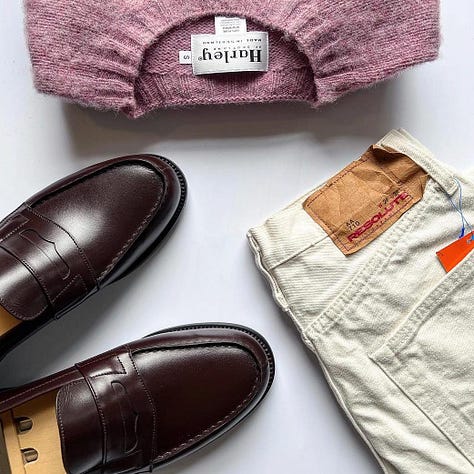

And now All Blues Co carries very reputable brands like J. M. Weston, Baudoin & Lange, and Alden.
Exactly. And these are very hard-to-get brands. Often, a brand representative comes in person to check whether the store deserves to carry the brand. Everything has to be neat on that day. I have already owned numerous pairs by that time so I knew the subject by experience. They appreciate it. We had a tailor in the store. It’s far more complex than simply carrying a selection of decent brands. But when you hit the right balance they recognize it regardless of how much you order. That’s why I have so much respect for these brands.
In my humble opinion, All Blues Co boasts one of the most curated selections in the world of slow fashion. If you look at the brands and styles it’s all classics. J. M. Weston loafers, Alden Indy boots, Harley Shetland sweaters, Rocky Mountain Featherbed downs, Camber sweatshirts, Asahi deck shoes, etc. All the usual suspects. Yet, there are virtually no other shops that manage to maintain that classic Ivy Style without diving in a whole lot of other directions. Why is that?
Because I am a consumer first. Well, yes, I’m a store owner as well. But I’m a consumer first. I have been obsessed with clothes since I was a kid. I love clothes. I love to wear it. I love to buy stuff. It’s an addiction. If I like it, I buy it. I don't care.
Do you how many pairs of Alden I bought from eBay to find my last? It took me ages before I ever bought a new pair.
I have jeans that don’t fit. I have shoes I’ve never put on. It’s not for everyone. You have to go through all that suffering to know your stuff.
But also, I’m really lucky with our customers. All Blues Co customers are simply the best. They are savvy, they come from different backgrounds, they love digging into things.
Oh, I have a funny story by the way. So we ordered the Resolute 714 jeans, the new style. And normally I am the one to give customers advice on size and fit. But this time a customer of ours who had already bought a pair from Japan wrote me in paragraphs about the jean’s fit suggesting I make corrections to our size chart. How good is that?
You know what they say. You want to treat people like you want to be treated. I want to dress people like I want to be dressed. That’s why I still buy loads of stuff outside the shop. Because one day they may end up in All Blues Co.
And that’s how you started your own eponymous line of clothing.
Well, a big part of producing my own line is to make All Blues Co more resilient. They can’t take your brand away from you by placing bigger orders. They can’t spoil the reputation of your line by stocking it everywhere. You are the only one responsible for both the quality and reputation of your own line.
Then again, I’m fortunate to have made enough connections in South Korea to now produce the outerwear I want to dress myself in.
Let me give you an example. We used to carry Karakoram jackets (editor's note: the legendary puffer silhouette originally introduced by Eddie Bauer for the K2 expedition in the 50s) made by other brands that are now selling elsewhere. So this past winter we launched the All Blues Co version, with improved quality and fit. And since it’s our own line, we can update it according to customer feedback and personal preferences. For the next season, it will return in upgraded 60/40 matte fabric and a less puffed fit.
Another example is the Deep Pile Fleece jacket. I am particularly proud of how it turned out.


Oh, the Patagonia repro?
It’s not exactly a reproduction but it is definitely inspired by the fleece Patagonia used to make back in the day. The modern Patagonia doesn’t make a deep pile. They obviously could do it if they wanted to. But they are not interested in the nostalgia. They are a performance brand.
So not only did we make the vintage-inspired fleece, but we also ordered the custom deep pile fabric exclusive to All Blues Co. The resulting jacket is heavier than the original.
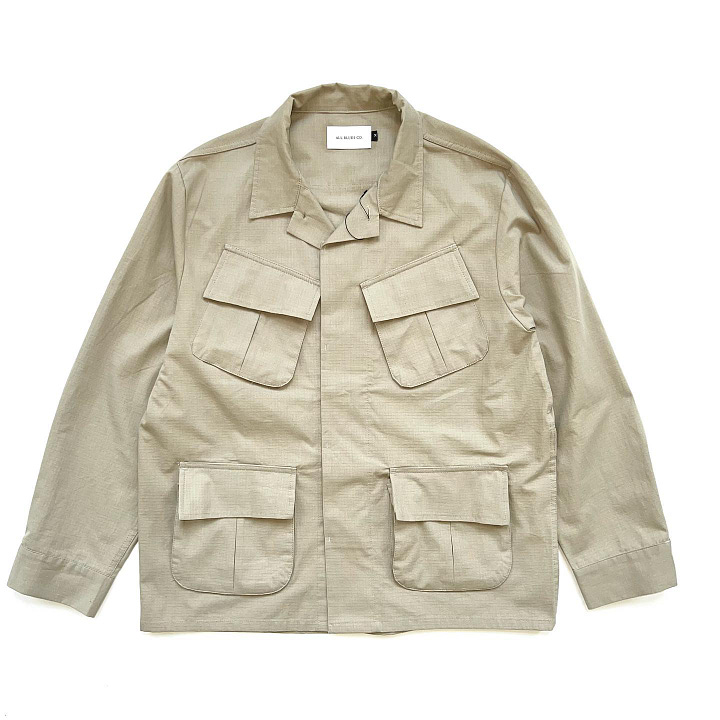
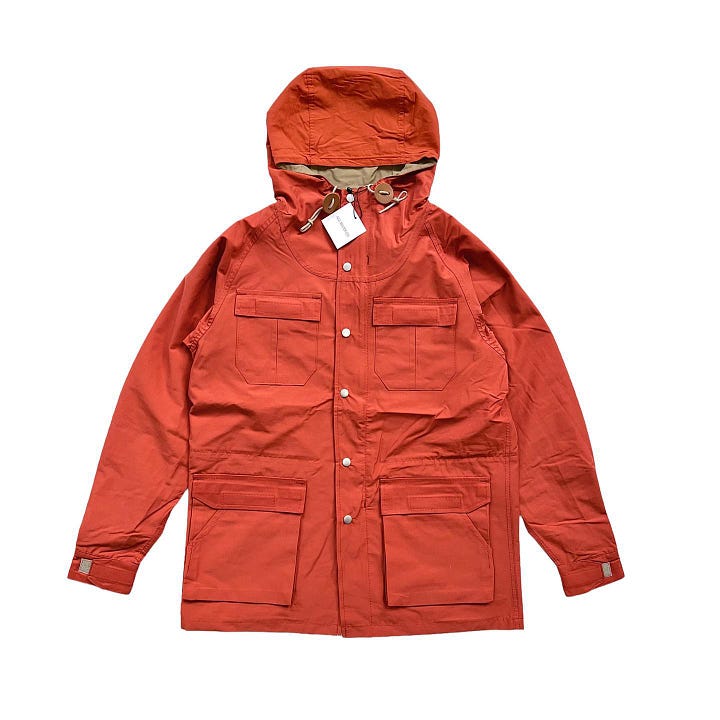
The Karakoram, the Deep Pile Fleece, the Jungle Jacket, the Mountain Parka. Like I said earlier, everything about All Blues Co feels very coherent. This coherence really differentiates the store from the others.
This ties well with my last question. What would you like to see more in this niche menswear game?
More diversity. More distinct styles. More brands that are different. Everyone can look good wearing a decent suit. That’s why they wear suits to a job interview or in court. Same with the minimalist Scandinavian stuff. It’s too easy.
If you are really into clothes you won’t ever stop digging and experimenting. This relates to both personal style and store/brand offerings. It is the only way to carve your own distinct style.
You can’t get there by copying what everybody else is doing and playing it safe.
What’s the point? It becomes really boring. Competing on marketing budgets and deepest discounts won’t get you far unless you are already a giant. That would be a very sad world to live in.
Before the internet, you had to go to the coolest shop in town to get your style references. Everything was physically disconnected. Now with the internet and Instagram, everything is just a tap away. While it provides you with an abundance of information it also commodifies everything to the most approachable options. Everything becomes uniform. Everyone looks the same.
I’m not particularly critical of it. As I said, love for clothes is not for everyone. But personally, I’d love to see more of this love.
That’s love. Thank you Mano for such a deep dive into this world of clothing we both love. I’m sure there are enough nerds out there who will enjoy this conversation as much as I did.
Thank you, man.
Thank you for reading the interview until the very end🙏 I would greatly appreciate it if you could share it on your social media to help others discover it too.
Give a follow to both Mano Dridi and All Blues Co on Instagram.
And if you would like further reading, here is a selection of my best articles:





